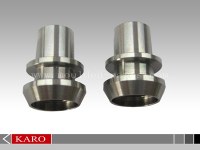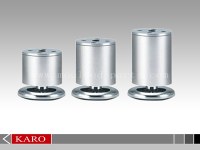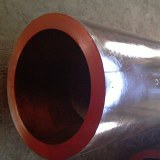LASER SEAM WELDING
Laser seam welding is a superior welding technique that provides precise and efficient joining of two metal sheets without the need for a filler or any post-processing. The laser beam melts the overlapping sheets together, creating a clean and smooth weld seam. Laser seam welder technology ensures a high degree of accuracy, allowing for the creation of contact-free and uniform weld seams. Unlike traditional welding methods such as MIG and TIG welding, laser seam welding offers the benefit of welding multiple layers of material at once, making it ideal for high-volume production settings. The resulting welded surface is stronger than the initial materials, providing superior durability and resistance to cracking. With the ability to work with a variety of metals, laser seam welding is essential for industries such as automotive, aerospace, and electronics, where welded joints must be precise and of high quality. If you want to know more about laser seam welding, please do not hesitate to contact the Xihe seam welder manufacturer.
LASER SEAM WELDING PROVIDED BY XIHE
Pot Cover Stainless Steel Belt Laser Welder
HOW DOES LASER SEAM WELDING WORK?
As an automated seam welding, laser seam welding is a precise welding technique used to join two metal sheets together. The process utilizes a laser beam which melts the edges of the sheets, creating a clean and homogenous weld seam. The welding process can be controlled easily through a computer-based system, ensuring that the weld is conducted with high accuracy and precision. The laser energy is focused through optics, which creates a narrow and intense beam that melts the metal at the welding point. The process is clean and allows for the welding of thin sheets without the need for a filler or post-processing. Ultimately, laser seam welding provides a cost-effective and reliable method for welding that is widely used in industries that require high-quality and precise welded joints.
BENEFITS OF LASER SEAM WELDING
1
Precision: Laser seam welding offers exceptional accuracy and precision as the focused laser beam ensures that the metal is melted at precisely the right location. This results in a clean and uniform weld with minimal distortion or warping.
2
Speed: Laser seam welding is a fast process where the laser beam can move quickly over the metal sheets. This translates to a high production rate, enabling the manufacture of large volumes of welded products in a short period.
3
Consistency: Laser seam welding provides excellent consistency in the weld quality. The automated system ensures that the welding parameters remain consistent throughout the process, reducing the risk of defects and achieving a uniform result.
4
Efficiency: Laser seam welding is an energy-efficient process that requires less power compared to traditional welding methods. It also eliminates the need for a filler material, resulting in less waste and reducing production costs.
AUTOMATED LASER SEAM WELDING SYSTEMS AND PROCESS CONTROL METHODOLOGIES
Automated laser seam welding systems use robotic arms and sensors to control and execute the welding process. These systems are used in industries where high production rates, uniformity, and precision are essential. The automated systems can control the laser beam intensity, speed, and other parameters, ensuring that the welding process is conducted accurately and with a high degree of repeatability.
Process control methodologies ensure that the automated welding system operates within the desired range of parameters. Monitoring and controlling the welding process require feedback systems that measure the temperature, laser power output, and beam position. Feedback systems can alert the operator if the welding process deviates from the allowable range. Automated systems can also adjust parameters during the welding process to achieve optimal results.
Process control also involves quality assurance initiatives, such as inspection and testing of welded parts. Non-destructive testing techniques, such as radiography, ultrasound, and magnetic particle testing, can detect any defects or deviations in the welded parts.
Automated laser seam welding systems also offer remote access and monitoring capabilities, which allow operators to monitor the welding process in real-time. The data collected from these advanced systems can be analyzed to identify trends, patterns, and potential areas for improvement, leading to the development of more efficient processes.
In summary, automated laser seam welding systems combined with process control methodologies offer an efficient way to execute and monitor welding processes in various industrial applications. With their high precision, accuracy, and uniformity, they reduce defects and increase productivity, ultimately leading to higher quality products and customer satisfaction.
COMPARISON OF LASER SEAM WELDING WITH OTHER WELDING TECHNIQUES
Laser seam welding is a welding technique that has several advantages compared to other traditional welding techniques, such as TIG (tungsten inert gas) welding, MIG (metal inert gas) welding, and spot welding.
One of the primary advantages of laser seam welding is its high precision and accuracy. The laser beam creates tight, narrow weld lines, which results in less distortion and minimal heat-affected zones. This makes it ideal for welding seams in thin sheets of material or in areas that are difficult to access.
Laser seam welding is also a fast, efficient process, with speeds that are up to ten times faster than traditional welding methods. This makes it highly suitable for large-scale production in industries such as automotive, aerospace, or medical devices.
Furthermore, laser seam welding requires little or no post-weld processing, which reduces the overall production time and costs. In comparison, traditional welding methods require post-weld grinding, cleaning, or polishing, which increases the production lead time and cost.
Lastly, laser seam welding is environmentally friendly, as it produces minimal waste and fumes during the welding process. By comparison, traditional welding methods, such as gas welding or electrode arc welding, use consumables such as electrodes and shielding gas that produce waste and emissions.
In summary, laser seam welding is an innovative technology that provides high accuracy, fast production rates, reduced post-weld processing, and is environmentally friendly. These features make it a preferred choice for different applications over conventional welding methods.
Hot laser seam welding provided by xihe: 1000 watt laser welder.
APPLICATIONS OF LASER SEAM WELDING
FIRST
Automotive Industry: Laser seam welding is widely used in the automotive industry for welding car body components, such as doors, hoods, and fenders. It provides precise and consistent welds that are strong and long-lasting, improving both the safety and durability of the vehicles.
SECOND
Medical Device Industry: Laser seam welding is utilized in the medical device industry for welding metal parts of implants and surgical tools. This technique offers precise and uniform welds that ensure the quality and safety of the medical equipment.
Aerospace Industry: Laser seam welding is increasingly used in the aerospace industry for welding precision components and structures. This technique enables the fabrication of complex shapes and high...
THIRD
Aerospace Industry: Laser seam welding is increasingly used in the aerospace industry for welding precision components and structures. This technique enables the fabrication of complex shapes and high-quality welds, making it ideal in the production of aircraft parts that require high strength and precision.
Now the price of seam welder for sale is reasonable, if you have needs, please contact us.
As one of laser welding machine manufacturers, we will do our best to meet all the needs of customers.
Location : No. 28 Jinteng Road, Wuxiang, Yinzhou District, Ningbo, 315111 ningboxihe,
Contact : .com ningboxihe, 0574 88328237








